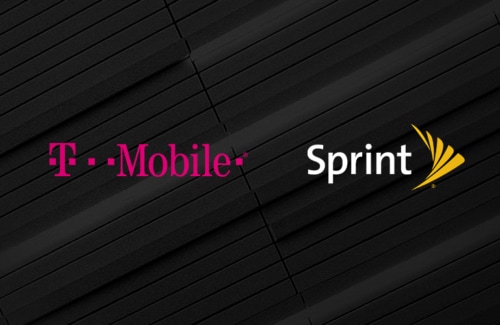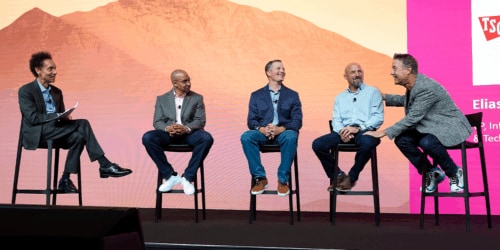For months now, I have been talking about all the good things the New T-Mobile would do for consumers and for the country – and what we will do to spark competition and innovation in the 5G economy. As I’ve shared before, the facts make it clear that keeping the status quo is not just wrong, it’s bad. Really bad. But did you know it can get worse?
If you’re one of the 30 million small business owners in the U.S., I’m sure you’re already nodding your head. Yes, things in wireless today go from bad to abysmal when we start talking about wireless for businesses – especially small businesses. As we mark Small Business Week this week, I want to take a second and really look at the broken status quo for small businesses in this country, especially those in rural areas.
Look, small businesses are the lifeblood of the American economy, but don’t take my word for it. Just a few facts. Small businesses…
- employ nearly half of all working Americans.
- create nearly TWO-THIRDS (64%) of all private sector jobs each year.
- and generate 16 times more patents per employee.
In fact, T-Mobile relies on an entire army of local and small businesses who make sure we run smoothly.
The Other Guys Have Trapped Businesses in the Wireless Past
Small businesses NEED wireless and broadband. Connectivity is critical to drive sales, engage customers, communicate with employees, stay connected in the field and more. Without good wireless and broadband service – small businesses struggle to compete. This is true for virtually all businesses these days – not just those in urban and suburban areas. In rural areas, nearly 20% of small businesses generate the vast majority of their revenue (at least 80%) online.
So it’s absolutely frightening to know that AT&T and Verizon control 90% of the business market in our industry. And because of their overwhelming market share, they penalize and punish and over-charge these businesses right and left.
For years we’ve been dragging Verizon and AT&T kicking and screaming on our mission to change wireless for good. And while Verizon and AT&T have copied so many of our Un-carrier moves with some sort of imitation moves, they’ve done it ONLY for consumers – NOT businesses!
Wireless today for businesses is a lot like wireless for you and me (aka consumers) in 2013 before the Un-carrier came along. Two-year service contracts, bill shock, data buckets, overage penalties, and so many more punitive practices. Millions of businesses are still on a two-year service contract… and even more are still on limited data buckets.
Worse, the Carriers’ pricing for businesses is still a secret, so you have no idea if you’re getting a good deal or getting screwed (protip: you’re probably getting screwed). And you’ve got to negotiate with them to get a deal. If you’re a small business, you are too busy running your business to negotiate in some back room with AT&T suits.
And for way too many businesses, they don’t have any real choice – except to put up with it. If you think it’s a hassle to switch your family of 4, try switching your small business of 40!
This broken system is hurting our economy, too. Listen to this! According to a report from the U.S. Chamber of Commerce, 66% of rural small businesses claim that slow Internet or mobile connectivity negatively impact their businesses. Not only does this hurt business owners, but it also leaves untapped potential to boost the local and U.S. economy. This same report found that improving access to digital technology for rural business could add over $140 BILLION to the U.S. economy over the next three years and create an additional 360,000 full-time jobs in rural communities.
New T-Mobile: Creating Competition, Lowering Prices and Letting Small Businesses Thrive
This is why we need the New T-Mobile. We’ve made strides in freeing businesses from the Carriers. T-Mobile for Business has grown more than 20% year over year, winning new customers and fans and freeing businesses of all sizes from the Carriers. Businesses that use us, LOVE us. They love the transparency, the coverage and the personalized customer service from our Team of Experts. In fact, T-Mobile for Business has swept the J.D. Power Wireless Satisfaction Study for Businesses of all Sizes two years in a row.
But even with all that momentum, we are still barely making a dent. New T-Mobile will change all that. With the combined resources of Sprint and T-Mobile, we can build a network with 15x more capacity by 2024 than Sprint and T-Mobile have combined today. We will deploy transformative nationwide 5G for everyone, and we will bring the value of the Un-carrier to businesses across the country.
Behind the power of this new and amazing network, we will finally have the scale and the resources to redefine the way small businesses connect to the internet and offer them a real alternative. We will innovate and use our unmatched 5G network to diversify our offerings, challenge the status quo and force the other guys to do the same. And we’ll do it all while staying true to our customers-first mentality, by offering higher quality services at a substantially better value.
Nowhere is the broken status quo hurting small businesses more than in rural America. With the New T-Mobile’s spectrum and scale, we’ll cover 95.8% of this country’s roughly 62 million rural residents with 5G mobile broadband service. That’s why we’ve committed to building at least 600 new retail stores across the country to bring new competition to these underserved small towns.
The New T-Mobile is for the farmer in Iowa that can more easily access markets for his or her product and rollout IoT solutions to better monitor hundreds of acres of crops. It’s for the destination restaurant or hotel in a quiet far-flung location that struggles to source products and interact with potential customers. It’s for the manufacturer that needs an even playing field to stay in business. A recent study estimated rural small businesses can grow revenues by more than 21% over three years with better use of online tools and digital access. For many, that’s the difference between growing and closing the doors. The New T-Mobile can help!
More than giving businesses in rural America better options and offering them a better deal on mobile internet connectivity, New T-Mobile can give entrepreneurs and innovators everywhere the kind of 5G network America deserves, so they can invent the future like they’ve done so many times before in our country’s history. New T-Mobile is for the thousands of small towns across America that have seen their youth leave and never come back due to the lack of local job opportunities.
As we celebrate Small Business Week, it’s time to think about overhauling the small business status quo. With the New T-Mobile, Small businesses across America will finally spend less time, energy and resources on shoddy, overpriced wireless service. That means more money is left for small businesses owners to invest back into their organizations and grow, grow, grow.
It’s time to create a real competitor and deliver real competition in wireless and beyond. It’s time to give small businesses another option. It’s time for the New T-Mobile!
John
Important Additional Information
In connection with the proposed transaction, T-Mobile US, Inc. (“T-Mobile”) has filed a registration statement on Form S-4 (File No. 333-226435), which was declared effective by the U.S. Securities and Exchange Commission (the “SEC”) on October 29, 2018, and which contains a joint consent solicitation statement of T-Mobile and Sprint Corporation (“Sprint”), that also constitutes a prospectus of T-Mobile (the “joint consent solicitation statement/prospectus”), and each party will file other documents regarding the proposed transaction with the SEC. INVESTORS AND SECURITY HOLDERS ARE URGED TO READ THE JOINT CONSENT SOLICITATION STATEMENT/PROSPECTUS AND OTHER RELEVANT DOCUMENTS FILED WITH THE SEC WHEN THEY BECOME AVAILABLE BECAUSE THEY WILL CONTAIN IMPORTANT INFORMATION. The documents filed by T-Mobile may be obtained free of charge at T-Mobile’s website, at www.t-mobile.com, or at the SEC’s website, at www.sec.gov, or from T-Mobile by requesting them by mail at T-Mobile US, Inc., Investor Relations, 1 Park Avenue, 14th Floor, New York, NY 10016, or by telephone at 212-358-3210. The documents filed by Sprint may be obtained free of charge at Sprint’s website, at www.sprint.com, or at the SEC’s website, at www.sec.gov, or from Sprint by requesting them by mail at Sprint Corporation, Shareholder Relations, 6200 Sprint Parkway, Mailstop KSOPHF0302-3B679, Overland Park, Kansas 66251, or by telephone at 913-794-1091.
No Offer or Solicitation
This communication shall not constitute an offer to sell or the solicitation of an offer to buy any securities, nor shall there be any sale of securities in any jurisdiction in which such offer, solicitation or sale would be unlawful prior to registration or qualification under the securities laws of any such jurisdiction. No offering of securities shall be made except by means of a prospectus meeting the requirements of Section 10 of the U.S. Securities Act of 1933, as amended.
Cautionary Statement Regarding Forward-Looking Statements
This communication contains certain forward-looking statements concerning T-Mobile, Sprint and the proposed transaction between T-Mobile and Sprint. All statements other than statements of fact, including information concerning future results, are forward-looking statements. These forward-looking statements are generally identified by the words “anticipate,” “believe,” “estimate,” “expect,” “intend,” “may,” “could” or similar expressions. Such forward-looking statements include, but are not limited to, statements about the benefits of the proposed transaction, including anticipated future financial and operating results, synergies, accretion and growth rates, T-Mobile’s, Sprint’s and the combined company’s plans, objectives, expectations and intentions, and the expected timing of completion of the proposed transaction. There are several factors which could cause actual plans and results to differ materially from those expressed or implied in forward-looking statements. Such factors include, but are not limited to, the failure to obtain, or delays in obtaining, required regulatory approvals, and the risk that such approvals may result in the imposition of conditions that could adversely affect the combined company or the expected benefits of the proposed transaction, or the failure to satisfy any of the other conditions to the proposed transaction on a timely basis or at all; the occurrence of events that may give rise to a right of one or both of the parties to terminate the business combination agreement; adverse effects on the market price of T-Mobile’s or Sprint’s common stock and on T-Mobile’s or Sprint’s operating results because of a failure to complete the proposed transaction in the anticipated timeframe or at all; inability to obtain the financing contemplated to be obtained in connection with the proposed transaction on the expected terms or timing or at all; the ability of T-Mobile, Sprint and the combined company to make payments on debt or to repay existing or future indebtedness when due or to comply with the covenants contained therein; adverse changes in the ratings of T-Mobile’s or Sprint’s debt securities or adverse conditions in the credit markets; negative effects of the announcement, pendency or consummation of the transaction on the market price of T-Mobile’s or Sprint’s common stock and on T-Mobile’s or Sprint’s operating results, including as a result of changes in key customer, supplier, employee or other business relationships; significant transaction costs, including financing costs, and unknown liabilities; failure to realize the expected benefits and synergies of the proposed transaction in the expected timeframes or at all; costs or difficulties related to the integration of Sprint’s network and operations into T-Mobile; the risk of litigation or regulatory actions; the inability of T-Mobile, Sprint or the combined company to retain and hire key personnel; the risk that certain contractual restrictions contained in the business combination agreement during the pendency of the proposed transaction could adversely affect T-Mobile’s or Sprint’s ability to pursue business opportunities or strategic transactions; effects of changes in the regulatory environment in which T-Mobile and Sprint operate; changes in global, political, economic, business, competitive and market conditions; changes in tax and other laws and regulations; and other risks and uncertainties detailed in the Form S-4, as well as in T-Mobile’s Annual Report on Form 10-K for the fiscal year ended December 31, 2018 and in its subsequent reports on Form 10-Q, including in the sections thereof captioned “Risk Factors” and “Cautionary Statement Regarding Forward-Looking Statements,” as well as in its subsequent reports on Form 8-K, all of which are filed with the SEC and available at www.sec.gov and www.t-mobile.com. Forward-looking statements are based on current expectations and assumptions, which are subject to risks and uncertainties that may cause actual results to differ materially from those expressed in or implied by such forward-looking statements. Given these risks and uncertainties, persons reading this communication are cautioned not to place undue reliance on such forward-looking statements. T-Mobile assumes no obligation to update or revise the information contained in this communication (whether as a result of new information, future events or otherwise), except as required by applicable law.




